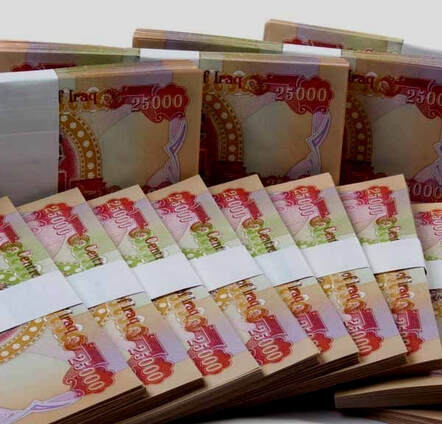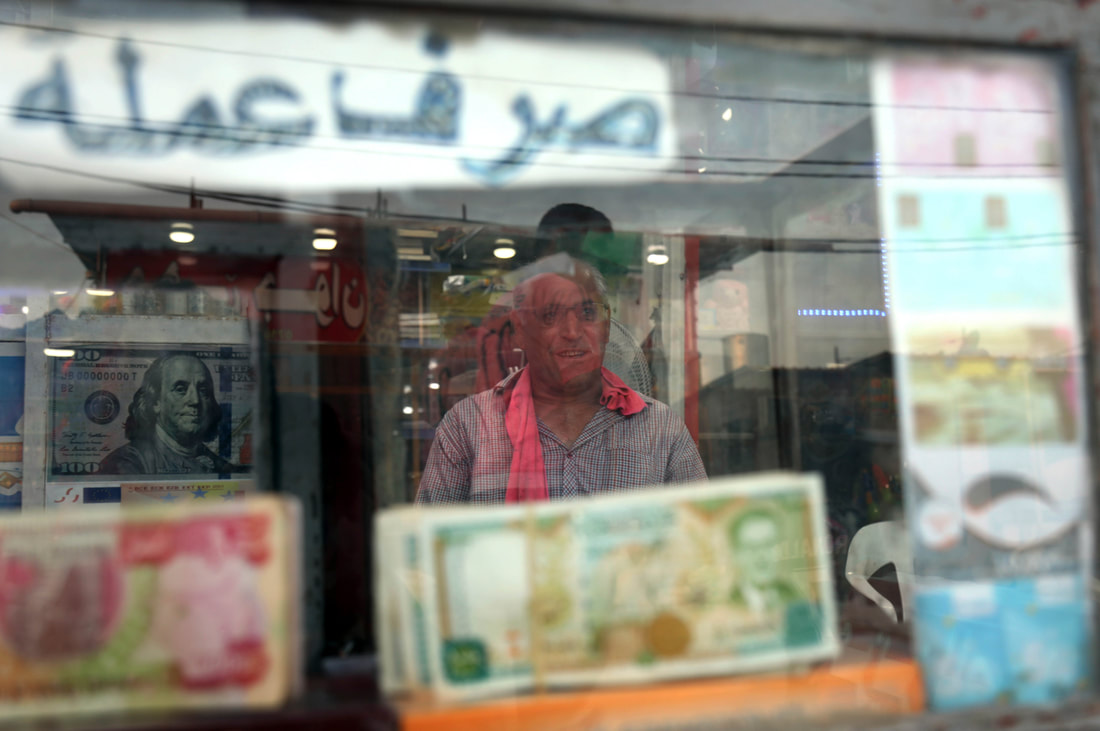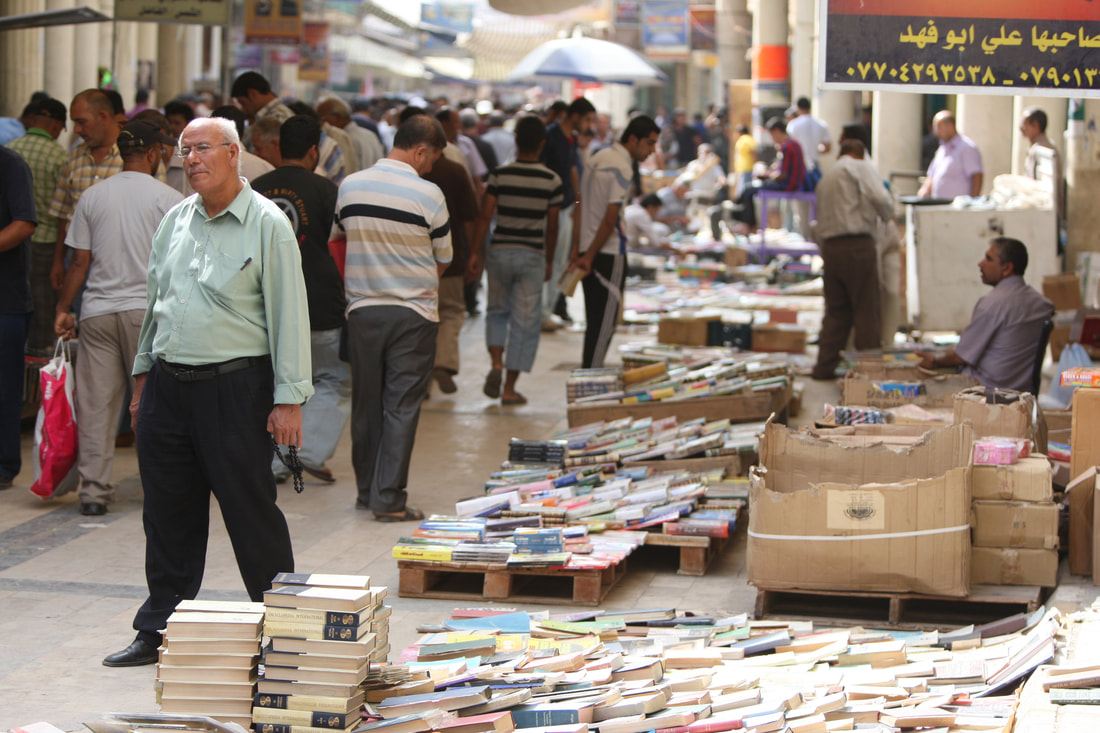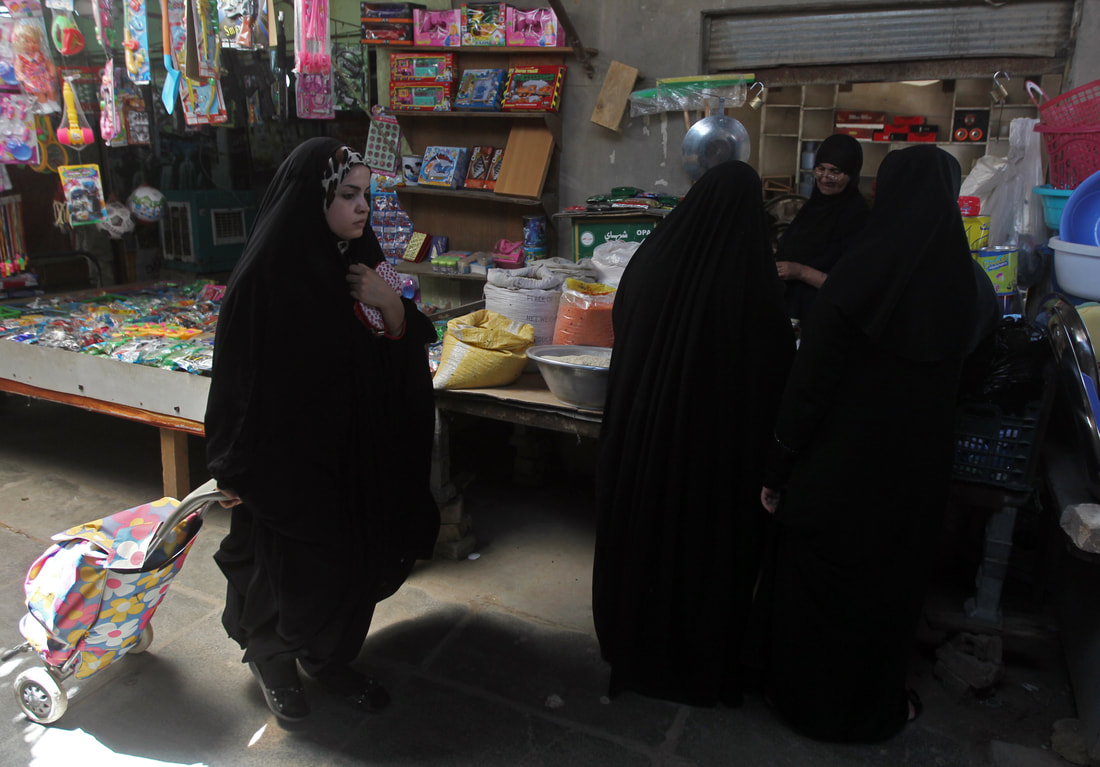 Iraqi dinars are tearing up in the streets of Mosul and other areas under the mob campaign organized by the American occupation forces in Iraq, while many are wondering about the fate of the Iraqi currency and the future of monetary dealings in Iraq, and some analysts believe that as long as the fate of Iraq and its people is no longer clear, how can one expect what the fate of the dinar will be. ?! Will the current currency remain, or will it be exchanged and which central bank will issue it, and where are the corresponding reserves, or will the American dollar replace it at any price, or will barter operations be within the Iraqi market are the most popular ?! The Iraqi dinar declined inside Iraq and after the fall of Baghdad In the hands of the occupiers, the price of the dollar becomes between 3500 and 4000 Iraqi dinars compared to 2000 dinars at the beginning of the war, while it is still the currency in circulation there and is being dealt with in some markets of neighboring countries, including the Jordanian market, in small quantities and a narrow range. Mr. Zayan Zawana, an economic and banking marketing expert, believes that the Iraqi currency of all its Swiss and other editions has lost its value in all the correct legal and jurisprudential meanings and concepts of the currency, and that is not now, but for a long time, due to the lack of foreign currency reserves against it, explaining in a statement to the "Constitution" that the issuance of the Iraqi currency For more than ten years, it was a matter of managing the affairs of people inside Iraq, as they were not based on any monetary or financial support and were not matched by reserves that supported the legal currency, especially in light of the restriction imposed on Iraq for a period of 13 years, and the Iraqi government did not control its resources Of the oil exports that were in the hands of the United Nations under the memorandum of understanding. The expert Zwanah, who was one of the former senior officials in the Central Bank of Jordan, stated that the prices of the Iraqi dinar, in its various canceled and used versions, were the result of dealings and speculation in the markets, stressing that the price difference between the different versions of the Iraqi dinar has no value in relation to the evaluation of the currency. The Iraqi dinar is the Iraqi dinar. . He said that it is difficult to predict what will happen to the future of the Iraqi dinar in light of the chaos and chaos that we see today in Iraq and the absence of an Iraqi administration or authority for monetary affairs, a “central bank,” so forecasting the future cannot take place in this situation He explained that what makes the matter more difficult is that the situation that prevailed before the occupation is the existence of an original Iraqi dinar, but it is officially canceled, but it is dealt with in the northern areas under the control of the Kurdish parties, while there are other editions of the dinar used in all regions of Iraq, and there was a price for each who are they. In response to a question about the possibility of issuing a new Iraqi currency, Mr. Zawana pointed out that any new currency must be based on a monetary, financial and political economic scenario, and this does not exist now, in addition to that Iraq, as it is known, does not now have any foreign reserves that it can rely on to issue a new currency. . He said that the new monetary issue should have strong political support, and he wondered about the extent of the Americans ’desire to issue a new Iraqi currency for which they would provide support so that stability returns to life in Iraq, including monetary stability, stressing that monetary stability is very important for the continuation of life in a normal manner. He said that no one now is He pays attention to the importance of monetary stability, which is one of the most important and sensitive matters that should concern every Iraqi citizen, as currency is the life of the people, the economy and the nation, indicating that people now occupy themselves by analyzing what happened militarily and politically and do not pay attention to their lives and to the extent of the destruction that befell them and their institutions, including the bank Central and dinar. Mr. Zwana clarified that the ability and desire of the Iraqi monetary parties, experts and cadres of the Central Bank, and the Ministry of Finance must also be taken into consideration in dealing with the new data after the occupation, and this undoubtedly will place a great responsibility on the Americans in dealing with officials and experts of the Central Bank and Finance if they wish to do so or Bringing experts from abroad, indicating that any new monetary arrangement must take into account coordination between the United States and the International Monetary Fund to set up clear mechanisms and take the matter into all its legal and practical dimensions in light of the current conditions in Iraq. On the issue of the Iraqi currency that has been canceled since the beginning of the nineties and is being circulated in the north of Iraq, he said that no one can make a change in this matter based on the data that we see now, especially since this matter has political implications. On the other hand, the Americans, the other currency is used among all the Iraqi people in all regions. No one can expect which of the two currencies will be exchanged in the future. On the possibility of substituting the dollar in principle as another or alternative currency, the expert Zwanah said that “dollarization” may be part of the solutions imposed by the nature of the market in light of unstable conditions and the absence of monetary authority until a new currency is issued with economic, monetary and political data. On the other hand, foreign exchange market sources in Amman indicated yesterday that the trading price in Iraqi dinars remained stable yesterday, as the price of one million Iraqi dinars of the Swiss edition bearing the image of horses ranged between 25,000 Jordanian dinars for purchase and 28,000 dinars for sale. While the price of the print bearing Saddam Hussein's image per million Iraqi dinars ranged from 11 thousand Jordanian dinars for purchase and 14 thousand dinars for sale, and it is noticed the expansion of the margin between the sale and purchase price as a result of the increased risk of carrying the Iraqi currency, and the values of the circulation of the Iraqi dinar in Amman in a narrow range with some money changers.
0 Comments
Mustafa Al-Saffar (a pseudonym) lost 400 thousand dollars in one day, after the decision of the Central Bank of Iraq and the Ministry of Finance to reduce the value of the local currency against the dollar by about 20 percent, in a decision that many described as sudden and "bad timing." Al-Saffar, who requested that his real name not be revealed, told Al-Hurra that the Central Bank of Iraq calculated the new prices of the dollar on the old deals to buy the currency, which caused great losses to the banks and banking companies, one of which Al-Saffar owns. Al-Saffar asserted that "a decision like this could not be issued overnight. This reminds us of Saddam's random financial policies. They should have attended the market for this decision months ago." The Iraqi government says that the decision to change the exchange rate of the Iraqi dinar from 1190 dinars per dollar to 1450 dinars is "necessary for economic reform" and that "the reason for the deterioration of the economy is due to years of wrong policies," according to two statements by the Ministry of Finance and the Iraqi Central Bank. 'Timing problem' The Iraqi expert in economic affairs, Manar Al-Obaidi, says that "the eternal problem in Iraq, especially in the economic side, is at the time when the decision is taken," adding to the Al-Hurra website that "the crisis is caused by the sudden timing of the decision, regardless of the positive or negative points of the process." Change the exchange rate. " Al-Obaidi believes that the impact of the devaluation will be negative at the beginning of the stage, which will "last for six months or a year", and after that "it will contribute to improving the GDP from various sectors such as the industrial, agricultural and service sectors, because it will increase the activity of these sectors." According to Al-Obaidi, Iraq is ready for the growth of the economic sector, and that "the infrastructure does not need more than a competitive environment, to revive hundreds of existing projects, but they are stalled or not operating at full production capacity as a result of the imported product controlling the local market." An informed source from within the Iraqi government told Al-Hurra website that "the low oil price and the impact of the Corona pandemic encouraged the government to take the difficult decision," according to his description. The source, who requested anonymity, added that "the government plan is based on the assumption that the devaluation of the Iraqi currency will make imported goods more expensive and give locally manufactured Iraqi goods the ability to compete, which will develop the economy after some time." According to the source, who participated in the 2021 budget discussions, "the large Iraqi operational expenditures in dinars will decrease in real value, which will lead to the provision of necessary funds that Iraq needs," adding that "the government is still supporting the Iraqi dinar through the currency auction, but the support is reduced." Iraqi industry In fact, Iraqi industrialists say that the talk about the decision to devalue the Iraqi currency will lead to the encouragement of local industry "is too simplistic." The Iraqi industrialist, Moataz Kammouna, told Al-Hurra website that "the industry needs infrastructure such as electricity, sewers, water lines, transmission lines, import and export facilities, and all of these are not available." Al-Iraqi, Muhammad Al-Maamouri, an agricultural investor from Baghdad, says that "the government supported the import of agricultural materials and neglected to support local agriculture," adding to the Al-Hurra website that there could not be enough Iraqi agriculture to compensate for the rise in currency prices in a few months. The issue needs years and investments. big". The Iraqi economic expert, Hassan Al-Asadi, says that "the correlation of devaluation to the improvement of local industry is true in industrialized countries whose prices for manufactured goods decrease while reducing their currency, which encourages their export."And he adds that "the raw materials have increased in value after the devaluation of the dinar because it is imported, which means that costs have increased, and the years of Iraqi industrial inactivity have made Iraq lose the advantage of keeping pace with other countries with technology and destroying old infrastructure." According to Kamouneh, the Iraqi state "has been supporting imports for many years, while it should have invested in providing infrastructure and raw materials in order to push the Iraqi industry forward and control the bleeding of hard currency." Kamouneh also refers to "the control of militias and armed groups over politics, economy and weapons, which gives them a great opportunity to compete and deprives Iraqi manufacturers of any advantage." Future scenarios
The Iraqi economic expert, Hassan Shawkat, believes that "the government took part of the right decision at a very dangerous time." He added to Al-Hurra website that "this decision should have been taken in 2003 to encourage self-sufficiency and work at a time when the government has funds to help the affected groups so that the wheel of the economy can move." Shawkat believes that "the current conditions are not prepared for such a decision," adding, "but it is an inevitable result that the Iraqi government has not been able to avoid due to mistakes in economic policy for many years." According to Shawkat, Iraq is likely to slide into a major economic downturn that will last for years before the economy regains its equilibrium, and this is a "risky matter in an armed and unstable country like Iraq. The salaries paid by the state were one of the most important factors of its relative stability." Also, "the stability or rise of oil prices may enable the government to take mitigating measures for the consequences of this decision on citizens if it is serious about providing assistance, or international loans can be allocated to support the local industry." However, "this scenario faces the obstacle of corruption that has stopped all possible economic solutions." Previously, it has stopped it now, "according to Shawkat. Shawkat says that "the third scenario is that the owners of capital return to Iraq to invest in it, benefiting from the devaluation of the currency, but achieving this scenario is difficult because the funds required are enormous, and the security situation and the militia’s control make any investor think several times before entering Iraq." |
IQDBUY BLOGWelcome to the official IQDBUY BLOG. Find invaluable Articles and analytics here about Iraqi Dinar and Iranian Rial as well as other Middle Eastern currencies in General. You can comment on any articles or news and share them as well. Archives
June 2024
Categories |



 RSS Feed
RSS Feed